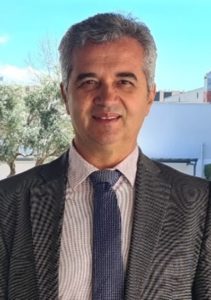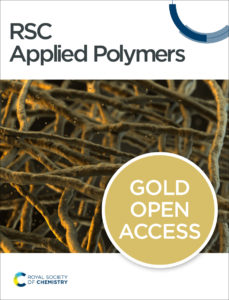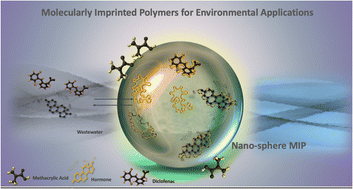RSC Applied Polymers has published its first articles. To celebrate this we wish to introduce some of our #RSCAppliedfirst50 authors and their recently published articles.
In this post we feature the contributing authors for the article ‘Application of molecularly imprinted polymers (MIPs) as environmental separation tools‘
An Introduction to ‘Application of molecularly imprinted polymers (MIPs) as environmental separation tools’ by Dr. George Z. Kyzas
Molecularly imprinted polymers technology is experiencing rapid growth in multiple scientific disciplines. Molecular imprinted polymers (MIPs) are synthetic polymers that are carefully constructed to possess specific pores matching the structure of the target material, displaying a remarkable selectivity toward it. In recent times, MIPs have emerged as valuable tools for the recovery of environmental pollutants due to their adsorption capabilities and adaptability to specific target pollutants. However, their environmental application has typically centered on various aspects, including the synthesis of MIPs, preparation methods, analysis methods, matrices and MIP components. One notable challenge in this regard is optimizing the interaction between monomers and functional groups.
Given the dearth of comprehensive reviews on the application of MIPs as environmental separation tools, especially regarding the critical role of functional groups, this review is structured to outline the interactions between primary functional groups and monomers and how these functional groups impact MIP performance. Additionally, we offer insights into how functional groups can significantly enhance the imprinting effect, resulting in a markedly increased imprinting factor and specific rebinding capacity. The results revealed that the monomers utilized in MIPs for non-covalent molecular imprinting procedures include MAA, 2-VP, dopamine, and styrene. Additionally, a crosslinker is employed to establish non-covalent interactions, with EGDMA being the most commonly used crosslinker. The majority of porogens utilized in MIP synthesis is acetonitrile.
The exceptional selectivity and sensitivity offered by MIPs have proven advantageous in numerous areas. To further enhance their properties, there is significant potential for introducing innovative approaches in the synthesis of MIPs by using diverse monomers and alternative solvents instead of the typical ones. By embracing green synthesis techniques, such as utilizing renewable reagents, minimizing the overall quantity of necessary reagents, and adopting safer analytical procedures, it is possible to implement approaches that prioritize sustainability and establish a “non-toxic” environment. Additionally, to impart new and desirable properties, MIPs can be integrated with inorganic materials like gold, silver or iron oxide nanoparticles, which display responsiveness to external physical stimuli. As we look towards the future, a higher demand for the utilization of green synthesis methods alongside MIP sample preparation techniques is anticipated.
This approach aligns with the principles of waste reduction, cost-effectiveness, ecological compatibility, production safety and conformance with sustainable chemistry. It is crucial to establish techniques that are both friendly to the environment and efficient for supervising food safety, addressing pollution and health concerns. The implementation of extraction systems based on MIPs will support the creation of analytical approaches that are eco-friendly, cost-effective, and fast by minimizing solvent usage. Ongoing research focuses on creating nano- or magnetic materials that can enhance the efficiency and capacity of analyte sorption.

Despina A. Gkika
Dr. Despina A. Gkika is an Economist and a researcher at the Chemistry Department of International Hellenic University. She graduated from the Business Economics Department, University of Portsmouth in UK and received her PhD on the Cost Profile of Nanomaterials from the University of Antwerp in Belgium, in 2021. She then worked as a postdoctoral researcher at the Chemistry Department of the International Hellenic University. Her research concentrates on the economic and sustainability assessment and on the interaction between economy, technology and environment. Her scientific interests concern the collaboration surrounding techno-economic analysis of adsorbent and photocatalytic materials for use in wastewater treatment. She is interested in conceptual and methodological aspects of assessing sustainability, therefore she uses (i) systemic techno-economic assessments (TEA); (ii) sustainability assessment methods, which brings economic, social and environmental information together (techno-economic assessment (TEA), life cycle costing (LCC), and cost-benefit analysis (CBA). Her work is recognized with (>310 citations, h index:8) based on Google Scholar database. She has published more than 30 scientific papers in high-quality academic journals Additionally, she has (co)authored 9 book chapters. She has been a reviewer in high impact journals published by Elsevier, Springer and Frontiers.

Athanasia Tolkou
Dr. Athanasia Tolkou is Chemist and Adjunct Professor at the Department of Chemistry at the International Hellenic University (IHU). She is now working at the Department of Chemistry (International Hellenic University, Kavala, Greece), as Postdoctoral Researcher (since 2021). Her research interests include wastewater treatment, municipal, industrial and hazardous wastewater treatment technologies (coagulation/flocculation, adsorption, ozonation, membrane bioreactors), recovery of nutrients (phosphates, nitrates) from wastewater and removal of ions, heavy metals and dyes from water and wastewater. Her scientific work has been published in more than 50 Papers in international journals, while she published 3 Chapters in scientific Books. Her work is widely recognized with 667 Citations (h-index 16) in Scopus and 940 Citations (h-index 18) in Google Scholar. She was/is the Guest Editor of 3 Special Issues and She is a reviewer in over 30 international scientific journals (Elsevier, Springer, Wiley, Taylor & Francis, Mdpi etc). She has also participated in about 17 research projects related to her field. She has research experience in the Technical University of Hamburg (Germany), Laboratory of Water Resources and Water Supply and at the University of Insubria, Varese (Italy) Department of Theoretical and Applied Sciences. She has also teaching experience in the Department of Chemistry of the University Maria Curie-Skłodowska, Lublin, Poland.

Dimitrios N. Bikiaris
Prof. Dr. Dimitrios N. Bikiaris is Chemist and Full Professor at the Chemistry Department of Aristotle University of Thessaloniki (https://bikiarislab.wixsite.com/bikiarislab). His research interests include the synthesis and characterization of polyesters and copolymers, biobased polymers, preparation and characterization of composites and nanocomposites, polymer blends, 3D printing, polymer recycling, modification of natural polymers, use of polymers for contaminants removal, microplastics and application of new biocompatible polymers in tissue engineering and pharmaceutical technology. His scientific work has been published in more than 543 scientific papers in international scientific journals, with over 25000 citations, and h-index 84 (scopus). He was participated in 66 research projects and he holds 15 international and 2 Greek patents. He has participated in more than 150 international and 50 national conferences, has been reviewer in more than 170 international journals and member of editorial committees in 15 scientific journals. His name is included in the list of World Top 2% Scientists, which is compiled by the Stanford University (USA) based on standardized citation indicators.

Dimitra Lambropoulou
Assoc. Prof. Dr. Dimitra Lambropoulou is Chemist and Asscoiate Professor on Environmental Chemistry in the Environmental Pollution Control Laboratory, Department of Chemistry, Aristotle University of Thessaloniki (AUTh). She is a member of the ENVIGREEN group of the Center for Interdisciplinary Research and Innovation (CIRI) of AUTh. Her main research interests are the development and application of novel sample preparation techniques coupled to advanced mass spectrometry approaches in the field of environmental chemistry, design and application of new materials in analytical and separation sciences, occurrence, transport, fate and effects of emerging contaminants (endocrine disruptors and pharmaceutical products, illicit drugs, polar pesticides, transformation products, nanomaterials and microplastics) in the environment (in waste and natural water), identification and structure elucidation of organic contaminants by high resolution mass spectrometry, application of “omics” techniques to environmental problems, wastewater-based epidemiology. She is also interested in the development of effective degradation and purification processes for the mineralization of organic micropollutants such as Advanced Oxidation Processes (AOPs). She has published more than 195 ISI papers (plus 2 books and 18 book chapters) that have received more than 9250 citations (Scopus, h index 53). She serves as Associate Editor for the journal Science of Total Environment (If 9.8) and as editor in the journals of Total Environment Advances and Current Opinion in Environmental Science & Health. She has been included in the list of World Top 2% Scientists for 2019-2022 which is compiled by the Stanford University (USA) based on standardized citation indicators.

Petros Kokkinos
Assoc. Prof. Dr. Petros Kokkinos is Molecular Biologist and Associate Professor at the School of Science and Technology of the Hellenic Open University (HOU). He has studied Biological Sciences at the University of Trieste, Italy, and holds a PhD from the Polytechnic School of the University of Patras, Greece. He has received nine (9) scholarships and has conducted research in UK, USA, Spain, and Switzerland. He is currently member of the Laboratory of Sustainable Waste Management Technologies (LSWMT Lab) and the Director of the Postgraduate Study Program ‘Cultivations under cover-Hydroponics’ of the HOU (since 2023). He has participated in more than 15 research projects, such as: 1) BioNFate (ARISTEIA I), “Fate and transport of biocolloids and nanoparticles in groundwater and effects of polluted water on public health”, 2) Archimedes III, “Wastewater Reuse – Development of a risk assessment model for public health protection”, 3) INVALOR research infrastructure (research infrastructure for waste valorization and sustainable management of resources), 4) Hybrid landfill leachate treatment model combining the use of advanced oxidation processes and membrane technology, 5) Resource oriented wastewater and sludge treatment in Greece and Germany. He has published 55 peer reviewed scientific papers (h-index: 21, Scopus, 05/01/2024, citations >1500), 44 publications in international conferences, 28 publications in Greek conferences, and a scientific book. He is Guest Editor of 2 Special Issues, invited reviewer in 16 scientific journals and Associate Editor in Environmental Water Quality (specialty section of Frontiers in Water). He has given 21 invited talks, and participated in 8 training seminars. He has organized 2 conferences, 2 symposiums, 8 summer schools, 2 seminars, and 5 workshops. He has supervised 35 postgraduate thesis. His research interests include Water Pollution, Wastewater Reuse, Biology of Wastewater Treatment, Environmental Virology, Risk Assessment and Public Health.

Ioannis K. Kalavrouziotis
Prof. Dr. Ioannis K. Kalavrouziotis with PhD in Environmental Geochemistry from Department of Geology, University of Patras, Greece (1999) is currently a Professor and President of Hellenic Open University, and is Director of Education on Wastewater Management Master Programme, and Visiting Fellow in the University of Derby, UK (2015-2018). Guest Professor of Hubei University, China (09 May, 2019- 2022). He taught at the Department of Environmental and Natural Resources Management, University of Western Greece (2000-2013). He has completed administrative responsibilities as: Agronomist of the Greek Ministry of Agriculture (1988-2000), Director of Western Greece Region Administration (1993), Member of the Administrative Board of the National Agricultural Research Foundation (2006-2009), President of the Sector for the Management of Messologion Lagoon (2006-2009). He is a member of IWA and President of IWA Symposium on ‘Water, Wastewater, and Environment: Traditions and Culture’, 2014, Patras, Greece, a Chairman of IWA Specialist Group on Water and Wastewater in Ancient Civilizations. President of the Regional Council for Research and Innovation of the Western Greece Region (2020-2024). He has published 6 Books and chapters, 120 peer-reviewed full research papers in International Journals, 81 papers in International Conferences, 38 papers in National Conferences and more than 120 articles in journals and newspapers.

George Z. Kyzas
Dr. George Z. Kyzas is Chemist and Full Professor at the Department of Chemistry at the International Hellenic University (IHU). He is now working at the Department of Chemistry (International Hellenic University, Kavala, Greece), being the Head/President of the Department (since 2019). He is also the Head of Hephaestus Laboratory (since 2023) and the Director of the MSc in Cosmetic Chemistry (since 2021). His research interests include the synthesis and characterization of various (majorly adsorbent) materials (inorganic, aluminates, polymers, graphene, activated carbons, agro-food residues, nanomaterials, CNTs, etc.) for environmental applications (wastewater treatment). His scientific work has been published in more than 270 Papers in international journals, while he published 9 Books, 42 Chapters in scientific Books and holds 3 Patents. His work is widely recognized with 16,000 Citations (h-index 71). He is the Editor of the journal “Environmental Science and Pollution Research” (Springer, IF 5.8). His name is included in the list of Highly Cited Researchers for 2022 (Thomson Reuters – Clarivate WoS) [0.1% most impactful Scientists in the World]. Also, his name is included in the list of World Top 2% Scientists for 2019-2022 which is compiled by the Stanford University (USA) based on standardized citation indicators. He has also participated in about 25 research projects. He is a Reviewer in more than 200 scientific journals (RSC, ACS, Elsevier, Springer, Wiley, Taylor & Francis, etc) and participates as Chair of Expert Panelists and Assessor/Evaluator/Reviewer in National, European and International research proposals/calls/projects.
Application of molecularly imprinted polymers (MIPs) as environmental separation tools
Despina A. Gkika, Athanasia K. Tolkou, Dimitra A. Lambropoulou, Dimitrios N. Bikiaris, Petros Kokkinos, Ioannis K. Kalavrouziotis and George Z. Kyzas
RSC Appl. Polym., 2024, Advance Article. DOI: 10.1039/D3LP00203A
 |
RSC Applied Polymers is a leading international journal for the application of polymers, including experimental and computational studies on both natural and synthetic systems. In this journal, you can discover cross-disciplinary scientific research that leverages polymeric materials in a range of applications. This includes high impact advances made possible with polymers across materials, biology, energy applications and beyond.
|



